Trump Won’t Assert Executive Privilege Against Comey Testimony
The Trump Administration will not try to stop former F.B.I. Director James Comey from testifying before the Senate Intelligence Committee on Thursday.
With former F.B.I. Director James Comey set to testify Thursday morning before the Senate Intelligence Committee, one of the questions overhanging the hearing was whether he would be able to testify at all. For the better part of last week, the White House was declining to say whether or not the President would seek to potentially halt Comey from testifying by asserting Executive Privilege with respect to any communications between the President and Comey during the time that Comey was serving as F.B.I. Director. Had he done so, there likely would have at least delayed Comey’s testimony since it would have likely required a court battle over the issue, with Administration lawyers battling with Committee lawyers in what would have potentially been one of the most consequential debates about Executive Privilege since the Nixon Administration. As it turns out, though, there will be no such legal debate because the White House has announced that it will not be asserting Executive Privilege with respect to Comey’s testimony:
WASHINGTON — White House officials said on Monday that President Trump would not invoke executive privilege to try to block James B. Comey, the F.B.I. director he fired, from testifying before Congress this week, clearing the way for a hearing that may be the most anticipated in Washington in months, if not years.
Mr. Comey is scheduled to appear before the Senate Intelligence Committee on Thursday for his first public discussion of the events that led to his dismissal last month in the midst of leading an investigation into associates of Mr. Trump’s. Lawmakers are especially interested in reports that Mr. Trump sought to persuade Mr. Comey to shut down an investigation into the president’s former national security adviser.
It was not clear that Mr. Trump would have succeeded in stopping Mr. Comey from testifying had he chosen to cite executive privilege. The Supreme Court has found that presidents enjoy a right to confidentiality in communications with their advisers, but it is not an absolute privilege and courts have overridden such claims in the past.
If Mr. Trump had tried to assert executive privilege and the Senate committee challenged him in court, legal experts said, Mr. Trump had a weak case because he has himself publicly discussed his private conversations with Mr. Comey.
“The president’s power to assert executive privilege is well established,” Sarah Huckabee Sanders, a White House spokeswoman, told reporters. “However, in order to facilitate a swift and thorough examination of the facts sought by the Senate Intelligence Committee, President Trump will not assert executive privilege regarding James Comey’s scheduled testimony.”
The president fired Mr. Comey on May 9 as the F.B.I. was looking into contacts between Russia and Mr. Trump’s associates. While Mr. Trump and his aides initially said he had acted at the recommendation of the deputy attorney general because of the way Mr. Comey handled last year’s investigation into Hillary Clinton’s emails, Mr. Trump later said that he had already decided to fire the F.B.I. director regardless of any recommendations and that he had the Russia investigation in mind.
In the weeks since, associates of Mr. Comey have said the former director felt uncomfortable about efforts by Mr. Trump to compromise the bureau’s traditional independence. Just days after Mr. Trump’s inauguration, he invited the director to dinner and, according to people familiar with Mr. Comey’s account, asked him repeatedly for his loyalty, which Mr. Comey declined to give. Mr. Trump has denied that he did so, but he said it would not have been wrong if he had.
A few weeks later, the day after Mr. Trump pushed out Michael T. Flynn, his national security adviser, who had provided misleading accounts of a phone call with Russia’s ambassador, the president asked Mr. Comey to drop the investigation into Mr. Flynn, according to notes taken contemporaneously by Mr. Comey and read to a New York Times reporter. Mr. Comey refused.
The idea of Executive Privilege originates, somewhat ironically given the outcome of the case, from the Supreme Court’s 1974 opinion in United States v. Nison. In that case, which was handed down just weeks before President Nixon resigned from office amid the gathering storm of Watergate, the Supreme Court ruled unanimously that the President must turn over the tapes he had recorded in the Oval Office regarding his conversations with advisers regarding the Watergate break-in, the subsequent investigation of that break-in, and the effort to cover-up evidence of links between that event and the White House and close advisers to the President. In doing so, though, the Court ruled that there is at least a limited privilege that exists that prevents a President or those close to him from having to reveal the contents of certain communications. In doing so, the Court recognized the need for the existence of such a privilege by citing the importance that there exist some level of confidence that confidential matters discussed by and between the President and top Executive Branch appointees will remain private. The Court ruled, however, that Executive Privilege is not an absolute privilege and that there are circumstances when it could be ignored if asserted if there was a larger public interest that required disclosure of the communications in question, such as the proper investigation and, if necessary prosecution, of a potentially criminal act on the part of the President or another official. Based on that criteria, of course, the Court ruled that Nixon could not withhold the tapes being requested, thus setting in motion a chain of events that revealed once and for all the extent of the President’s involvement in illegal activities and the attempt to obstruct justice in the Watergate case. Since then, there have been a handful of instances in which a President has asserted Executive Privilege and, in fact, the doctrine has been invoked by nearly every President that has served since Nixon’s resignation at one time or another.
The possibility that the Trump White House would seek to invoke Executive Privilege to stop Comey’s anticipated testimony is one that has been discussed in detail over the past two weeks or so and it was clear from most of those discussions that any assertion of the privilege would have been legally perilous at best. The main reason for that, as CNN Legal Analyst Page Pate explained in a post over the weekend, is because it seems clear that the President waived the privilege when he spoke himself about the substance of his conversations with Comey:
In striking down a president’s attempts to use executive privilege, courts have focused on the reason the privilege was being asserted — was it to protect sensitive information in the public interest, or an attempt to hide potential evidence of misconduct? No court has ever allowed a president to use executive privilege to cover his own possible wrongdoing.
Courts have also looked at whether the substance of the communications had already been publicly disclosed. The Fast and Furious case is a great example. The Obama administration had already made public disclosures about its deliberations relating to that operation, so there was no need to use the privilege to maintain executive branch secrets.
In this case, Trump’s media interviews, his termination letter to Comey and his random tweets have already made his meetings with the ex-FBI chief a matter of public concern. Just like the travel ban litigation, it looks like Trump’s mouth has again foreclosed a legal defense he may really need.
The fact the White House is even thinking about asserting executive privilege raises another important question — why would Trump want to stop Comey from testifying about their meetings? There is only one reason I can think of — Trump lied.
In his interview with NBC News’ Lester Holt last month, Trump said that Comey had assured him “three times” he was not being investigated. If true, then I would think Trump would want to have Comey corroborate that in a public hearing. But is it true? Comey would not have told Trump he is not a potential target because he knows better than to disclose that kind of information.
Immediately after describing his version of discussions with Comey, Trump sent out a tweet warning Comey he “better hope there are no tapes” of their conversations. Why would Trump say that before Comey had a chance to respond to Trump’s version of the meetings? Was it because Trump must have known his version was not the truth and wanted to launch a pre-emptive strike against Comey before Comey could respond.
That’s the same approach the White House is using now to question Comey’s credibility before his upcoming testimony. The White House is worried that Comey will have a very different version of those discussions and that he felt pressured by Trump to drop the pending investigation into former national security adviser Michael Flynn. If I were in the White House, I would be worried, too.
But being worried about potentially embarrassing testimony is not a sufficient basis to invoke executive privilege. If Trump tries to stop Comey from testifying about their discussions relating to the Flynn investigation, Comey should just ignore him and do it anyway. It’s highly unlikely a court would prevent Comey, who is now a private citizen and no longer a government employee, from talking.
Eric Columbus, an attorney who served in the Justice Department and Department of Homeland Security under President Obama raises a different argument at Politico:
Executive privilege is a notorious Gordian knot that has yielded surprisingly few judicial decisions, because courts typically prefer that Congress and the president hash out such disputes themselves. Some have suggested the former FBI director’s testimony is necessary for Congress to fulfill its oversight responsibilities; others say Trump waived any privilege by blabbing about his meetings with Comey.
While these theories may help untangle the knot, there’s a way to slice it wide open: Comey can’t be restrained from testifying before the Committee because he’s now a private citizen who wants to talk.
Executive privilege is a shield against attempts by Congress and courts to pierce the executive branch’s defenses to gain access to testimony or documents. It’s rooted in the notion of separation of powers. As the Supreme Court noted when it held that President Richard Nixon could not refuse to turn over the Watergate tapes, executive privilege preserves “the supremacy of each branch within its own assigned area of constitutional duties.” The doctrine rests on a recognition that the president and subordinate officials require some confidentiality in order to operate effectively. Due to the paucity of judicial decisions and absence of relevant constitutional text, the scope of such confidentiality is hotly disputed between Congress and any administration, especially under divided government. (As an official in President Barack Obama’s administration, I experienced the great joy of squaring off with GOP congressional staff over numerous requests for documents and testimony.)
But once Comey left office and signaled a willingness to testify, this ceased to be about separation of powers. Congress isn’t trying to pry loose information. Rather, an ex-employee with a story to tell wants to tell it to Congress.
(…)
A court would not enjoin Comey from testifying unless it could fathom a rationale that would also bar Comey from revealing the same information by writing a book, going on the Sunday shows, taking to Twitter or chatting at his local bagel shop. As a legal matter, all these venues are the same. And to impose such a gag order – a so-called “prior restraint” on speech – cannot be squared with First Amendment precedent.
Given these legal arguments, it’s possible that the Administration chose not to challenge Comey’s testimony so as to avoid setting up legal precedent that could undermine Executive Privilege in general going forward. Regardless of the reaon, though, this means that all of Washington, and much of the nation, will be on pins and needles ahead of Comey’s testimony Thursday morning.
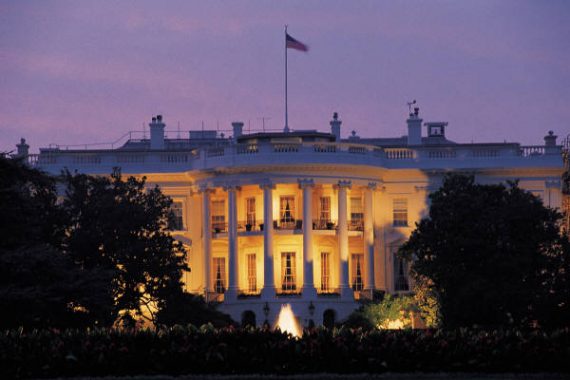

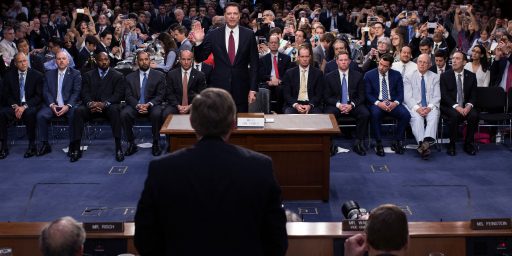
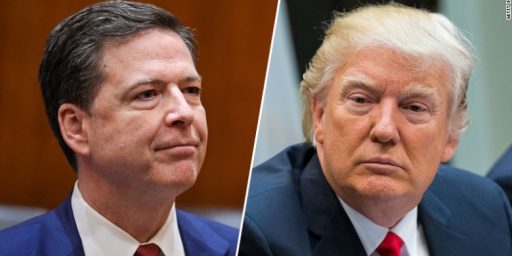
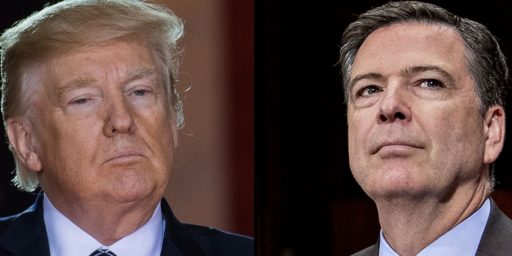
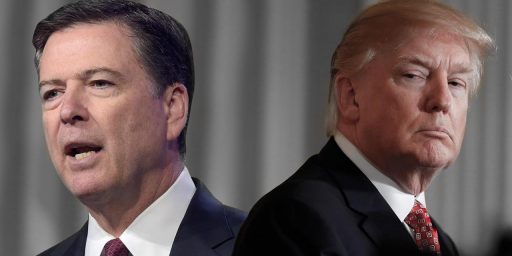

Wonder who talked some sense into him? Or rather, who was successful at muzzling him long enough to make him think it was his own brilliant idea to not shoot himself in the foot for the Nth time this week?
@KM:
“Wonder who talked some sense into him? Or rather, who was successful at muzzling him long enough to make him think it was his own brilliant idea to not shoot himself in the foot for the Nth time this week?”
There’s still plenty of time for Trump to tweet the opposite, leaving his appointees to scramble to show how they are not contradictory at all.
@Moosebreath:
Josh Marshall puts an interesting spin on the phenomenon I noted:
“Again, whether the President is ‘crazy’ isn’t a point I’m trying to get into. What is notable is that we are seeing in real time a White House and an administration trying to force a distinction between what a notional ‘President Trump’ has set as policy (usually meaning the policies key advisers have articulated) and the actual person Donald Trump who we see on Twitter and occasionally in unscripted press settings saying and doing things that often totally contradict his own policies.
(snip)
Where this goes, it is impossible for me at least to say. While the American president has monarchical characteristics, it is not a monarchy. While it is understood that the President sometimes has policies which he and hopefully in the future she may not understand in full depth or fully know about, the US system is based on at least a broad belief that the President is a real person, who has some relationship to the person on whose behalf advisers and cabinet secretaries claim to speak. This last really bad week seems to have gotten us to a new point in which administration leaders are openly saying that the President doesn’t speak for himself or his administration. Either in people’s understanding of what Presidents are supposed to do or in the humiliations these descriptions likely amount to for Trump himself, this does not seem like a sustainable solution to the Trump problem.”
@Moosebreath:
That is precisely what I was thinking: that Trump will tweet the opposite Thursday at 5:27 a.m. Do you want to bet?
Or maybe it would be better to have a pool on the exact tweeting time.
Or maybe because firing the guy in charge of an investigation into your political campaign and then asserting executive privilege to keep him from testifying to Congress screams “I’M GUILTY OF SOMETHING AND TRYING TO COVER IT UP!!!”
@Mikey:
I don’t think Trump understands even something that elementary.
@CSK: Probably earlier, maybe even the day before. He won’t ignore the sword over his head. Maybe come up with “Lying Comey” and a kangaroo court.
i was honestly hoping he would, cuz i wanna turn this knob to 11.
I’m at least mildly surprised that President Trump didn’t decide to invoke executive privilege. I would think that he’d want to set the marker for later.
test
I think he’s waiting for the travel ban SCOTUS decision to get a feeling on the solidity of his five votes. He won’t risk a severe slap-down until he knows that he can count on his team.
A yyuuuugge development that has nothing to do with Russia or Comey:
Turns out that big arms deal with the Saudi’s was nothing more than smoke and mirrors…fake news….similar to the Carrier charade only bigger. Most of the deals were signed off on by Obama.
https://www.brookings.edu/blog/markaz/2017/06/05/the-110-billion-arms-deal-to-saudi-arabia-is-fake-news/
@Daryl’s other brother Darryl: Good grief. Now take that in concert with the Saudi/Qatar diplomatic crisis, and add in our President’s morning tweets suggesting economic and political sanctions on Qatar (where the US’s largest base in the ME is located) and you get…?
@Daryl’s other brother Darryl:
@Jen:
Wasn’t this deal supposed to have been brokered by Jared?
@CSK: Yup. Fake deal.
I can’t get over the fact that Trump has been trashing Qatar on Twitter during the last half-hour. Someone has told him we have a big base there, right?
@Jen:
WTF???
I though our refusal to get involved was because of that base?
Does Dumb Don even know we have one there?
@Daryl’s other brother Darryl:
It’s possible he’s been apprised of that in the last half hour, I suppose.
@CSK:
So whomever is on OMG-He-Did-WHAT?! duty today raced in and frantically pointed out we have both citizens and military souls sitting in Qatar that His Orangeness is endangering right now so please please please don’t cause Benghazi 2? That we have military, financial and political ties he’s just pissing all over and that’s why we were staying out of this one? Oh look FOX News is on, let’s watch that instead Mr. President, you don’t need to tweet right now?
Would it be a mitzvah or enablement to send crates of antacid to the WH on a reoccurring basis? I do wish to improve my karma but it seems like encouraging bad moral and health behavior in helping them stay in that job……
@KM:
They’re probably all Zoloft junkies at this point.
@CSK:
I can’t wait for Spicer to explain to us that wasn’t what Dumb Donnnie was saying.
Like he didn’t lie in order to personally attack the Mayor of London in the immediate aftermath of a terror attack.
@Jen: Why would he be trashing Qatar when Ravi Shankar is his all-time favorite Qatarist? (Or was that a spoof–not that I care, you understand 🙂 )
Apparently Trump has a plan for Thursday.
Robert Costa, Washington Post Reporter was on MSNBC telling that according to sources inside the WH Trump is expected to be tweeting on Thursday in respond to Comey’s testimony.
Costa said: “But the president is expected to be tweeting on Thursday in response to Comey, not to stay quiet during the testimony,” he added. “Because he himself wants to be the one driving the process.”
Here’s the yYouTube link of the video: https://www.youtube.com/watch?v=1lXWdadEMew
@Just another interested outsider…. :
Yeah, cuz when someone’s testifying about you obstructing justice in front of Congress you totally want to be seen as “driving the process”. It’s absolutely essential to disrupt his testimony about how you were attempting to impede the pursuit of justice by currently trying to impede the pursuit of information.
SMH. This entire Administration is going to be the go-to example for the next decade of bad messaging and poor optics.
I still think the Comey thing will end up as a big nothing-burger. I’d like to be wrong…
@KM: Did you say “poor optics”? While this predates the election, Forbes has a piece out about how Trump basically strong-armed his own son’s charity, forcing it to pay for the use of his golf course for tournaments…that raised money for sick kids with cancer.
It’s all too much. And the Pentagon is apparently now trying to repair the damage done to the relationship with Qatar today.
OT: Forbes is reporting that “Trump Foundation funneled $100K in donations into revenue for Trump Organization” (That’s what the article in The Hill is called)
Here´s the link:
https://www.forbes.com/sites/danalexander/2017/06/06/how-donald-trump-shifted-kids-cancer-charity-money-into-his-business/#1990ecb06b4a
Everyday I think this whole circus can’t get worse, then BAM!
@Daryl’s other brother Darryl:
Even if it is a nothinburger vis-a-vis Comeys testimony, it will cause Trump to tweet something that will directly implicate himself in a crime, so….
@Daryl’s other brother Darryl:
@Neil Hudelson:
How do Trump’s Staff members or lawyers not either (a) physically separate him from his Twitter account during and after Comey’s testimony or (b) resign when he tweets play-by-play “rebuttals” to Comey?
@Joe:
They can’t separate Trump from Twitter unless they wrest his phone away from him. Literally.